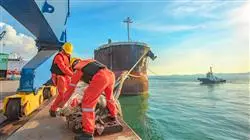University certificate
The world's largest faculty of engineering”
Introduction to the Program
Being responsible for managing shipyards or other types of marine facilities requires specific knowledge. At TECH we want to offer you the best education so you can achieve your objectives”

The Postgraduate diploma in Naval Management and Operations is a program of the highest academic level that aims to educate professionals in the field, enabling them to carry out their work with the highest quality and safety requirements. It is a very complete program, imparted by professionals with years of experience, and which includes the latest advances in the field.
The Postgraduate diploma will present the scope of basic structural, outfitting and electrical engineering as a basis for detailed engineering, as well as the necessary requirements for documentation and mandatory calculations to obtain approval from shipowners, classification societies and the flag authority. Innovation areas in basic naval engineering today, such as the use of 3D modeling tools and innovative virtual reality methodologies, will also be discussed. Another important point in naval engineering is to be familiar with the negotiation and feasibility processes that takes place at the beginning of projects. Thus, students will acquire the skills to define project design bases or conduct market and feasibility studies; and they will learn how to prepare budgets at different levels of precision, at both the CAPEX and the OPEX level.
Finally, students will be able to go through everything that affects naval vessels or crafts from the moment they leave the shipyard to being withdrawn from service. The necessary documentation for a ship to go to sea and start undertaking the activity for which it was designed will be thoroughly analyzed.
It should be noted that, as this is a 100% online Postgraduate diploma, students are not constrained by fixed schedules or commutes, but can access the contents at any time of the day, balancing their work or personal life with their academic life.
The completion of this Postgraduate diploma will place Naval Engineering professionals at the forefront of the latest developments in the sector”
The Postgraduate diploma in Naval Management and Operations contains the most complete and up-to-date educational program on the market. The most important features include:
- Case studies presented by experts in naval engineering
- The graphic, schematic, and practical contents with which they are created, provide scientific and practical information on the disciplines that are essential for professional development
- Practical exercises where self assessment can be used to improve learning
- Special emphasis on innovative methodologies in naval management and operations
- Theoretical lessons, questions to the expert, debate forums on controversial topics, and individual reflection assignments
- Content that is accessible from any fixed or portable device with an Internet connection
This Postgraduate diploma is the best investment you can make when selecting a refresher program in Naval Management and Operations. We offer you quality and free access to content"
The teaching staff includes professionals in naval engineering, who bring their experience to this training program, as well as renowned specialists from leading societies and prestigious universities.
The multimedia content, developed with the latest educational technology, will provide the professional with situated and contextual learning, i.e., a simulated environment that will provide immersive specialization programmed to learn in real situations.
This program is designed around Problem-Based Learning, whereby the professional must try to solve the different professional practice situations that arise throughout the program. To that purpose, students will be assisted by an innovative, interactive video system created by renowned and extensively experienced experts in naval management and operations.
This program comes with the best educational material, providing you with a contextual approach that will facilitate your learning"

This 100% online Postgraduate diploma will allow you to combine your studies with your professional work. You choose where and when to train"
Why study at TECH?
TECH is the world’s largest online university. With an impressive catalog of more than 14,000 university programs available in 11 languages, it is positioned as a leader in employability, with a 99% job placement rate. In addition, it relies on an enormous faculty of more than 6,000 professors of the highest international renown.

Study at the world's largest online university and guarantee your professional success. The future starts at TECH”
The world’s best online university according to FORBES
The prestigious Forbes magazine, specialized in business and finance, has highlighted TECH as “the world's best online university” This is what they have recently stated in an article in their digital edition in which they echo the success story of this institution, “thanks to the academic offer it provides, the selection of its teaching staff, and an innovative learning method aimed at educating the professionals of the future”
A revolutionary study method, a cutting-edge faculty and a practical focus: the key to TECH's success.
The most complete study plans on the university scene
TECH offers the most complete study plans on the university scene, with syllabuses that cover fundamental concepts and, at the same time, the main scientific advances in their specific scientific areas. In addition, these programs are continuously being updated to guarantee students the academic vanguard and the most in-demand professional skills. In this way, the university's qualifications provide its graduates with a significant advantage to propel their careers to success.
TECH offers the most comprehensive and intensive study plans on the current university scene.
A world-class teaching staff
TECH's teaching staff is made up of more than 6,000 professors with the highest international recognition. Professors, researchers and top executives of multinational companies, including Isaiah Covington, performance coach of the Boston Celtics; Magda Romanska, principal investigator at Harvard MetaLAB; Ignacio Wistumba, chairman of the department of translational molecular pathology at MD Anderson Cancer Center; and D.W. Pine, creative director of TIME magazine, among others.
Internationally renowned experts, specialized in different branches of Health, Technology, Communication and Business, form part of the TECH faculty.
A unique learning method
TECH is the first university to use Relearning in all its programs. It is the best online learning methodology, accredited with international teaching quality certifications, provided by prestigious educational agencies. In addition, this disruptive educational model is complemented with the “Case Method”, thereby setting up a unique online teaching strategy. Innovative teaching resources are also implemented, including detailed videos, infographics and interactive summaries.
TECH combines Relearning and the Case Method in all its university programs to guarantee excellent theoretical and practical learning, studying whenever and wherever you want.
The world's largest online university
TECH is the world’s largest online university. We are the largest educational institution, with the best and widest online educational catalog, one hundred percent online and covering the vast majority of areas of knowledge. We offer a large selection of our own degrees and accredited online undergraduate and postgraduate degrees. In total, more than 14,000 university degrees, in eleven different languages, make us the largest educational largest in the world.
TECH has the world's most extensive catalog of academic and official programs, available in more than 11 languages.
Google Premier Partner
The American technology giant has awarded TECH the Google Google Premier Partner badge. This award, which is only available to 3% of the world's companies, highlights the efficient, flexible and tailored experience that this university provides to students. The recognition as a Google Premier Partner not only accredits the maximum rigor, performance and investment in TECH's digital infrastructures, but also places this university as one of the world's leading technology companies.
Google has positioned TECH in the top 3% of the world's most important technology companies by awarding it its Google Premier Partner badge.
The official online university of the NBA
TECH is the official online university of the NBA. Thanks to our agreement with the biggest league in basketball, we offer our students exclusive university programs, as well as a wide variety of educational resources focused on the business of the league and other areas of the sports industry. Each program is made up of a uniquely designed syllabus and features exceptional guest hosts: professionals with a distinguished sports background who will offer their expertise on the most relevant topics.
TECH has been selected by the NBA, the world's top basketball league, as its official online university.
The top-rated university by its students
Students have positioned TECH as the world's top-rated university on the main review websites, with a highest rating of 4.9 out of 5, obtained from more than 1,000 reviews. These results consolidate TECH as the benchmark university institution at an international level, reflecting the excellence and positive impact of its educational model.” reflecting the excellence and positive impact of its educational model.”
TECH is the world’s top-rated university by its students.
Leaders in employability
TECH has managed to become the leading university in employability. 99% of its students obtain jobs in the academic field they have studied, within one year of completing any of the university's programs. A similar number achieve immediate career enhancement. All this thanks to a study methodology that bases its effectiveness on the acquisition of practical skills, which are absolutely necessary for professional development.
99% of TECH graduates find a job within a year of completing their studies.
Postgraduate Diploma in Naval Management and Operation
Not only large infrastructures on land offer interesting job opportunities for engineering professionals, those belonging to the maritime field and naval procedures: shipyards, ships, frigates, etc., constitute a prestigious avenue for professional growth, both for their fascinating and peculiar characteristics linked to the knowledge of the seas, as well as for their substantial monetary retributions. The Postgraduate Diploma in Naval Management and Exploitation is an academic program designed by TECH to enter this field with a dynamic, fast and at the reach of a click without leaving home. We have structured in 600 hours the expertise of a qualified group of instructors, an innovative bank of digital files and a methodology that is being a success in the market by combining distance learning with pedagogical models of advanced multidisciplinary development. In light of these advantages, our course will enhance your knowledge whether in conceptual engineering and 3D modeling of boats to environmental sustainability in search.
Specialize in shipbuilding management and operation
SS Ideal X. Does that name ring a bell? Well, it should, because it was the first ship in history to carry containers as an efficient way to move goods. Thanks to the success of its nautical voyage, today, according to data from UNCTAD (United Nations Agency for Trade and Development) between 70 and 80% of all international trade is carried out through this mode. Calculate then how much the daily operations of cargo ships and similar vessels between ports represent in monetary terms. The real profits are in naval engineering and management. This Postgraduate Diploma is your ticket to take advantage of this exciting field. In four modules dissected by an outstanding team of professors you will learn about: naval projects, negotiation and feasibility, shipyard management and operation of maritime artifacts such as ships. The best thing is that you can graduate managing your own time and accessing the classes anywhere, even from a smartphone. Enroll now and set sail for your future.







